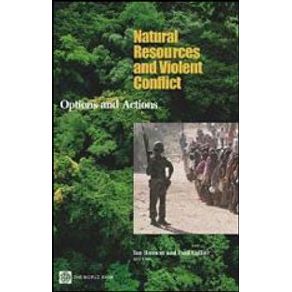Violent conflict can spell catastrophe for developing countries and their neighbors, stunting and even reversing the course of economic growth. Recent World Bank research on the causes of conflict and civil war finds that the countries most likely to be blighted by conflict are those whose economies depend heavily on natural resources. Natural Resources and Violent Conflict: Options and Actions first explains the links between resource dependence conflict and then considers what can be done to help reduce the risk of civil war in these nations. In this collection of previously unpublished essays by experts in the field, contributors consider the risks of corruption, secessionist movements, and rebel financing. They also consider the roles played by government, the development community, and the country’s population and propose an agenda for global action. Focusing on what we can do collectively to diminish the likelihood of civil war, contributors to this volume suggest practical approaches and policies that could be adopted by the international community- from financial and resource reporting procedures to commodity tracking systems and enforcement techniques, including sanctions, certification requirements, and aid conditionality. A fascinating look at the results of important new World Bank research, this book represents an important addition to the dialogue on development.


